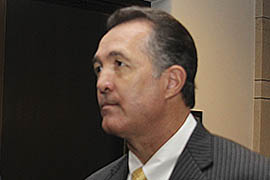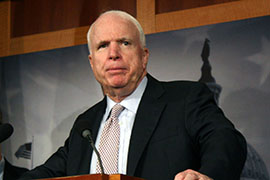Cronkite News has moved to a new home at cronkitenews.azpbs.org. Use this site to search archives from 2011 to May 2015. You can search the new site for current stories.
Arizona lawmakers give cool reception to deal on Iran’s nuclear program
WASHINGTON – Several Arizona lawmakers have weighed in on the Obama administration’s weekend announcement of an agreement intended to limit Iran’s nuclear program – and most are not pleased.
While the six-month agreement requires concessions from Iran in return for about $7 billion in relief, it does not go far enough in limiting that country’s uranium enrichment activities for critics, who say the “centrifuges will continue to spin.”
“When this ‘comprehensive’ agreement expires, it is highly unlikely that the Iranian regime will have given up its support of terrorism and the many other malign activities that currently threaten our friends and allies in the Middle East and our own national security interests,” Sen. John McCain, R-Ariz., said in a prepared statement Sunday.
A White House fact sheet released late Saturday says the agreement “halts the progress of Iran’s nuclear program and rolls it back in key respects,” while imposing monitoring and verification that will let international inspectors ensure Iran’s compliance.
The plan calls for Iran to stop uranium enrichment above 5 percent, dilute its near-20 percent enriched uranium and limit its use of the centrifuges that are needed for further enrichment. At 3 to 5 percent, uranium is considered usable for power generation, while at 20 percent and above it is considered weapons-grade, according to Andrew Klein, a professor of nuclear engineering at Oregon State University.
The agreement also requires Iran to cease progress on its heavy-water reactor site at Arak.
The agreement was finalized this weekend in talks between Iran, Germany and the five permanent members of the U.N. Security Council – the U.S., the United Kingdom, Russia, China and France. President Barack Obama called the agreement a “first step,” saying “diplomacy opened up a new path toward a world that is more secure.”
The president credited the use of sanctions against Iran as playing an important role in “the most significant and tangible progress that we’ve made with Iran” since he took office. The strongest sanctions will continue, he said, and he cautioned against the U.S. seeking to impose new ones over the next six months, adding that pressure could be brought to bear on Iran simply by reversing the relief granted in the agreement.
Rep. Raul Grijalva, D-Tucson, praised the agreement and congratulated Obama and Secretary of State John Kerry in a Facebook post Saturday.
“Diplomacy, not invasion – that’s what real leadership is about,” Grijalva said.
But Republicans were not as enthused. McCain said that while the agreement may “modestly slow Iran’s nuclear ambitions,” it is a dangerous step.
“Under this agreement, the centrifuges will continue to spin,” McCain’s statement said. “What’s more, this agreement is silent on the question of Iran’s nuclear weaponization efforts and development of delivery systems.”
While he was concerned about the agreement’s omissions and its easing of sanctions, McCain called the six-month expiration date a “bigger problem.”
Rep. Trent Franks, R-Glendale, who has sponsored a bill to allow U.S. military action if Iran uses “the cover of diplomacy to continue advancing its nuclear program,” called the agreement “the very definition of a bad deal.”
In a statement released by his office Sunday, Franks said the weekend’s accord “amounts to Mr. Obama crossing his fingers and hoping that the world’s largest state sponsor of terrorism … will behave reasonably.”
Rep. Paul Gosar, R-Prescott, who introduced a House resolution earlier this year expressing support for Israel’s right to defend itself against an Iranian nuclear threat, criticized the accord in a statement Monday, noting Iran’s “historically false assurances.”
“The president agreed to lift effective sanctions and received nothing of value in return,” Gosar said of the deal.
Rep. Matt Salmon, R-Mesa, also questioned Iran’s promises.
“Unfortunately, Iran has proven itself time and time again to be untrustworthy when making deals,” Salmon said. “There has been no concrete proof that they have changed their tune this time around.”
Even some Democrats were skeptical.
“This agreement is a step toward ensuring that Iran does not have nuclear arms capability,” said Rep. Ann Kirkpatrick, D-Flagstaff. “However, given Iran’s history of violations, I’m skeptical that they will commit fully to the terms of this agreement, and I am prepared to support tougher sanctions if necessary.”
Sen. Jeff Flake, R-Ariz., wrote on Twitter Saturday that he looked forward to “studying details” of the plan.








